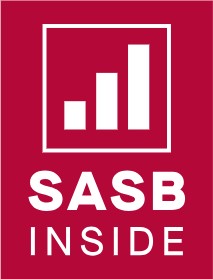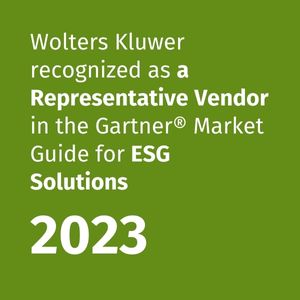Intelligent ESG and sustainability reporting that’s good for the world
ESG isn't just a regulatory process. It involves the close, consolidation, planning, reporting — and your reputation. With the right technology, CFOs can contribute to the ESG strategy, gain a competitive advantage, and build trust with investors, customers, and employees.
CCH Tagetik ESG and Sustainability Performance Management takes a corporate performance management approach to ESG. In addition to supporting ESG requirements, the true power of this solution is that it shows you how ESG initiatives and financial performance converge. With our tools for greenhouse gas (GHG) emissions tracking, CSRD disclosure, and other emerging ESG frameworks, we’ll help your organization create a better world -- and a better balance sheet.
Today’s consumers, governments, and investors aren’t just interested in what you do. They want to know how.
How does your business impact the earth? ESG reporting shows the good your company does by communicating the material impact of your ethics-driven strategy. ESG metrics are hard to measure. That’s why we’ve created CCH® Tagetik ESG & Sustainability Performance Management: an expert solution that helps you manage your business’s sustainability enterprise-wide.

CCH Tagetik ESG & Sustainability is licensed to apply the SASB Materiality Map®, full Standards, Climate Risk Technical bulletin content, Sustainable Development Goals mapping and Sustainable Industry Classification System (SICS)™.
CCH Tagetik ESG & Sustainability is also a licensed GRI Software & Tools Partner.
3 reasons why CCH Tagetik ESG & Sustainability lets you focus on your business
See CCH® Tagetik ESG & Sustainability Performance Management in action
CCH® Tagetik ESG & Sustainability for Carbon Emissions
-
Pewag Group
-
Generali
-
Manitou
-
A2A
-
Unicredit
CCH® Tagetik empowers Pewag Group's sustainable evolution through precise ESG reporting and a commitment to renewable energy, shaping a transformative journey.
Navigating sustainability: Pewag Group's ESG journey with CCH® Tagetik
Transforming finance: Generali's journey to sustainable reporting
A corporate culture of sustainability: ESG experience at Manitou Group
Creating a sustainable future: A2A's commitment to ESG and a circular economy
Integrating ESG into the fabric of UniCredit’s organization and operations
Support evolving ESG reporting requirements
CSRD, IFRS S1 and S2, the EU Taxonomy: ESG reporting has only just begun. Our pre-configured expert solution lays a foundation for calculating carbon emissions and future ESG disclosures. As ESG frameworks change and new requirements are added, we will continue to monitor regulatory trends and expand the solution.
- CSRD, IFRS, and EU Taxonomy-specific functionality
- Create disclosures confidently using pre-defined content
- Improve control using a process workflow and audit logs
- Centralize financial, nonfinancial, and ESG data
- Facilitate auditing processes with built-in calculations and standard reports
Keep a pulse on environmental, social, governance performance — and materiality
Balance short-term financial performance with long-term sustainability. With insight into the cause and effect of ESG initiatives on financial outcomes, you'll create plans that help serve ESG objectives, satisfy stakeholders, and make decisions that can improve your bottom line.
- Use strategic planning to support decision making
- Support limiting risk and optimizing resources with what-if analysis tools
- Simulate scenarios with the aim of optimizing your ESG score
- Create driver-based models to facilitate turning ESG insights into action
- Fine-tune costs with a powerful allocation engine
Environmental Social Governance (ESG) Resources
About ESG
-
Environmental social governance (ESG) is becoming increasingly important
ESG is a framework used to assess a company's sustainability and ethical performance. ESG helps investors make informed decisions by considering these non-financial factors, encouraging responsible operations, risk mitigation, and positive environmental and societal contributions. -
ESG has three pillars
Environmental, social, and governance reports include qualitative and quantitative information on three key topics:
- environmental impact
- social responsibility
- corporate governance.
The environmental aspect evaluates a company's efforts to be an environmental steward, reduce its ecological footprint, and promote sustainability. The social dimension focuses on improving lives and encompasses employee treatment, community engagement, and human rights.
Corporate governance assesses a company’s leadership, transparency, and accountability.
-
The goal of ESG reporting is ethical transparency
The larger goal of ESG is to protect the environment, the people companies affect, and the ethics under which companies operate. ESG reporting fosters transparency by exposing how organizations plan for, handle, and impact ESG factors. ESG reporting gives investors, consumers, and stakeholders an understanding of an organization’s ESG performance and values, and can serve to influence investing and purchasing decisions. ESG reporting provides a basis of comparison between competitors and holds organizations accountable for their ESG promises. -
ESG is strongly related to corporate governance
Corporate governance refers to the structures, processes, practices, policies, and rules that control and direct an organization and all corporate behavior. For companies, establishing corporate governance means a balancing act of stakeholders and their respective interests in an effort to align company activities with them.
There are two types of ESG stakeholders: internal and external. Internal stakeholders refers to those with interests within the company, including executives, management, the board of directors and employees. External stakeholders refers to anyone affected by the corporation, including customers, suppliers, shareholders, investors, financiers, government, regulators and the public at large.
Ideally, corporate governance creates a set of rules and controls that everyone in the company abides by in order to not just reach company objectives, but even in setting them. Corporate governance implicitly refers to managing and monitoring the activities within a company in order to mitigate risk and manage behavior in order to ensure corporate responsibility. It includes internal controls, performance management, reporting, disclosure, corporate values and data governance but that’s not all. A comprehensive approach to corporate governance puts all these processes within the larger social, regulatory and market environment.
For example, the UK’s Cadbury Report, the OECD’s Principles of Corporate Governance and the US’s Sarbanes- Oxley Act list a set of principles and guidelines that set a standard for corporate governance and internal controls in an effort to hold companies more accountable for ethics, record keeping and reporting integrity.
ESG regulations have landed on the desk of major authorities. The EU is leading the way with the EU taxonomy, Sustainable Finance Disclosure Regulation, and New Corporate Sustainability Reporting Directive all recently effective. Even in regions where compliance is not yet mandatory, many companies are voluntarily adopting ESG frameworks in order to demonstrate an early commitment to investors, consumers, and other stakeholders.






